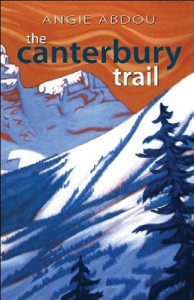 I follow @Angie_Abdou on Twitter, and she follows me. It’s a fun internet friendship. We have similar tastes in books and a penchant for crying at inopportune moments. And when I confessed that I have a strange obsession with climbing-related nonfiction, she asked if I’d enjoy climbing-related fiction and promptly mailed me a copy of her intense, addictive, and refreshing novel, The Canterbury Trail.
I follow @Angie_Abdou on Twitter, and she follows me. It’s a fun internet friendship. We have similar tastes in books and a penchant for crying at inopportune moments. And when I confessed that I have a strange obsession with climbing-related nonfiction, she asked if I’d enjoy climbing-related fiction and promptly mailed me a copy of her intense, addictive, and refreshing novel, The Canterbury Trail.
Of course, I’m going to digress — I lived in a town not unlike the fictional Coalton, BC. I fooled around with a boy or two insanely like F-Bomb, SOR and Loco, and while I never stayed in Banff long enough to get to ski season, I certainly did my share of dumb, dangerous things the two summers I spent there during university. And I got it. The reason why people live in places like Coalton. For me, and it’s not this way for everyone, it was one-part my youth and another part my need to run away, it wasn’t real life. I completely got Alison, the slightly-older journalist who decamped to the town and invited herself up the mountain with the boys just for the ride. When I lived in Banff, we had no television, no phone, no internet, no radio, no newspapers, nothing to tether us back down to society except beer, mountains, and elk. It was awesome.
So when the group of hard-core skiers with one snowboarder in tow head back up the mountain for one last run, I get it. So when the almost middle-aged former snow-heads take on the challenge even though he’s got a real job and she’s pregnant, I get it — they need one more instance where they feel alive. And when the snowmobilers arrive, well, I just roll my eyes at them because I know I have to — the machine isn’t pristine my friends.
And when the motley group ends up spending one of those nights in a cabin deep in the mountainside, their lives are forever changed and inextricably linked. I never did it in the snow. I only trundled up a few really high mountains and refused to take the gondola anywhere. But the feeling, that exhilaration, I can relate to it — I know what it’s like to run down a mountain at full tilt and crash into a glacier, I wouldn’t trade that memory for the world. But that’s the thing about nature — there could have just as easily been a bear at the end of that trail as their was a beautiful abyss. And like the water, you can’t win against the snow; no, you can’t win against the call of the snow, I suppose, and Abdou’s intense, even anxious writing in the most pivotal scenes, gets right to that point.
We (she and I) have had a number of Twitter conversations, discussions in an 140 characters, about the idea that nature gives Canadian literature an element of the grotesque. It careens people towards uncertainty with a healthy ego and a dash of sentiment, and churns them out the other end of the experience forever changed. And Abdou takes it all one step further in her book, she breaks your heart entirely by the end. But to let it slip, to discuss the ending, well, then you’d miss the point of the ride, entirely. And that, my friends, is something else I learned in Banff, just settle in and let yourself go because you’ll be surprised at how far you’ll travel.